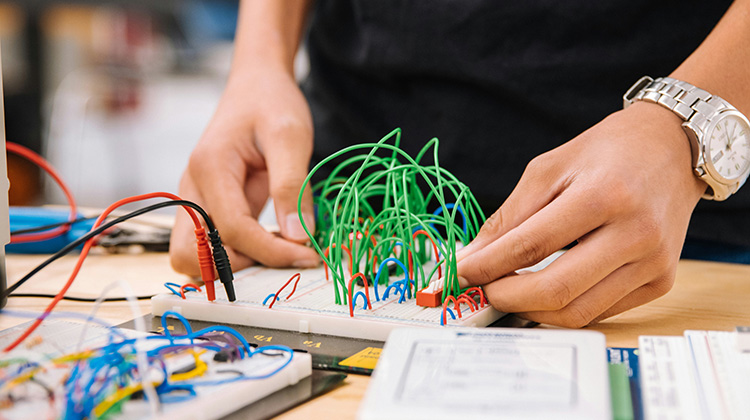You Don’t Need to be Einstein to Study STEM

STEM can seem intimidating, especially at a tertiary level, but giving high school students a taste of what they might have in store should they pursue a STEM course is taking some of the fear out of the equation.
Casuarina Senior College toured the Charles Darwin University (CDU) Casuarina campus science and technology facilities for the beginning of CDU and Inspired NT’s Stage 2 Real Science Program.
Post-graduate students only a few years older than the high schoolers will act as mentors to students from Casuarina and Darwin High School for the next seven months, guiding them through STEM-related projects from planning, execution to presenting.
The high school students will see what it’s like to study at university, learn about the tertiary pathways open to them, and develop confidence in themselves and their abilities.
Former Casuarina Senior College student Jessie Duncan participated in last year's program and is now studying a Bachelor of Environmental Sciences at CDU.
“The program opened my eyes to how many opportunities I have in this field, what I want to experience and how in depth I can go with research,” she said.
“It doesn’t matter how much knowledge of science you already have. You learn everything you need as you go and it’s so beneficial.”
Casuarina Senior College teacher Gregg Barker said last year’s students were involved in a variety of projects such as using of Microsoft Hololens mixed reality in STEM education, identifying the best growing environment for mushrooms, and dismantling and rebuilding a lawnmower engine.
“Working with a mentor from outside school provided students with new technical perspectives, helped them to become more confident and professional communicators, developed their ICT skills using MS Teams, and facilitated their planning, problem-solving and independent learning skills,” Mr Barker said.
It's a win win for everyone involved, through the program the post-graduate students can practice leadership and supervision skills, time management, empathy and flexibility through mentoring.
CDU PhD students Cedric Tan and Girum Gebremeskel Kanno are among this year’s mentors, and both were eager to share their knowledge and their personal and academic journeys into STEM.
Mr Tan’s research involves the development and testing of metals to reduce their damage within corrosive environments, while Mr Kanno is exploring how Artificial Intelligence can be integrated into the environmental life cycle assessment of healthcare plastic wastes.
“I’m hoping the students will realise that science isn’t necessarily scary,” Mr Tan said.
“It’s a very involved experience. It’s a lot of problem solving and being sure you’re engaged but if you can find something you’re passionate about, you’re going to get something out of it.”
Mr Kanno added: “STEM can be for everyone, and it should be fun.
“People might assume science is hard but so long as you’re interested, you can easily challenge and solve complex problems. We live in a world full of environmental problems and we need more people with a different approach to solving these problems."
Program coordinator and CDU Senior Lecturer in STEM Pathways Dr Carla Eisemberg hoped students would learn how science is an accessible pathway.
“The idea you need to be an Einstein to be doing STEM is wrong,” Dr Eisemberg said.
“We need people with everyday skills to become scientists and engineers, because we need people who have different ways of thinking. There is no innovation without diversity.
“We're creating an opportunity for our post-graduate students to interact with high school students in a safe way that high school students will learn what university feels like, and at the same time our post-grad students can kickstart their careers as mentors and supervisors.”
Image by Jeswin Thomas